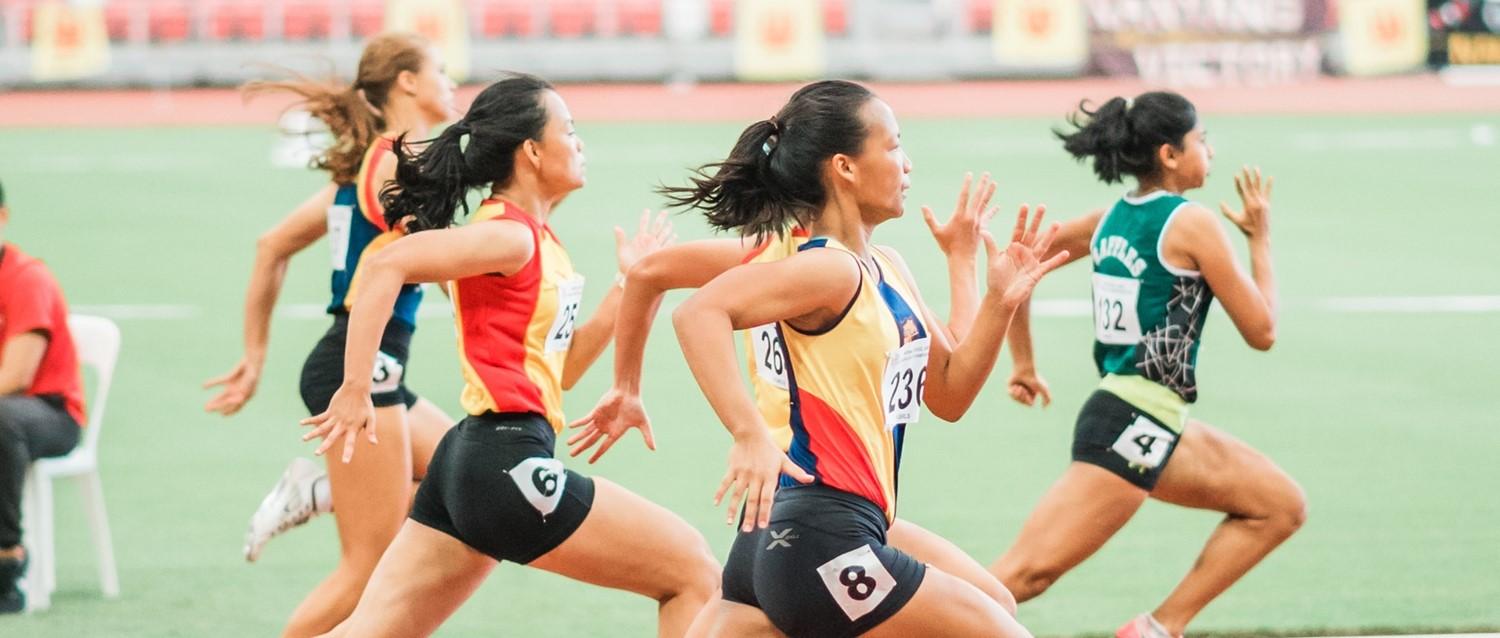
Faut-il faire de l'exercice pendant les règles ?
Peer reviewed by Dr Sarah Jarvis MBE, FRCGPAuthored by Abi MillarOriginally published 3 May 2020
- TéléchargerTélécharger
- Partager
Il est bien connu que le cycle menstruel peut avoir un impact sur l'exercice physique, et pas seulement pendant les règles. Les fluctuations hormonales peuvent influencer votre niveau d'énergie et vos performances tout au long du mois.
Dans cet article :
If you've ever seen a tampon advert, you'll be familiar with the format: a woman dances, plays tennis and rides a horse, all while wearing white trousers. The implication is that your period is not a time to curl up with a hot water bottle - it's a time to get active.
Of course, if you're one of the millions of women who suffer with PMSs, bloating or painful periods, the lifestyle sold in the adverts may seem a bit far-fetched. However, there's a grain of truth among the exaggeration. Exercise can be extremely beneficial during your period (though you may want to skip the white trousers).
"The idea that women should not exercise during their period is a complete fallacy, as this is the time of the month when the benefits of exercise can be at their greatest," says Dr Anne Henderson, a Doctify-rated consultant gynaecologist. "There is endorphin and serotonin release during and after exercise, which can have an antidepressant and mood-elevating effect. And, as most women who exercise regularly will know, pushing beyond the sensation of feeling tired is usually beneficial as exercise alleviates this symptom."
On top of that, the endorphin release can have a painkilling effect, which may give you some relief from cramps. And, since exercise increases bowel motility (the speed of digestion), it can help with bloating symptoms.
Poursuivre la lecture ci-dessous
The start of your cycle
This is not to say that you will necessarily be on top form at this time of the month. As Jocette Coote, co-owner of the boutique gyms F45 Farringdon and Ravenscourt Park, explains, both progesterone and oestrogen are at their lowest during your period, which can cause dips in energy. Rather than ceasing all activity, this is a good time to listen to your body and potentially try some new workouts.
"If you experience painful periods, also called dysmenorrhoea, you know all too well how uncomfortable this time of the month can be," she says. "The good news is that exercises such as light walking may help you decrease these symptoms."
Interestingly enough, this also might be a good time to do some strength training - and that applies all the way through until ovulation.
"Some research has found that strength training during the follicular phase (days 1-14 of the cycle) resulted in higher increases in muscle strength compared to training in the luteal phase (days 15-28 of the cycle)," says a spokesperson for the science team at Clue, the period tracking app. "Therefore, if you start paying attention to your cycle phases, you may find your strength training pays off the most in your follicular phase."
Sélection de patients pour Les règles et les problèmes de règles

Santé des femmes
Pourquoi de plus en plus de jeunes femmes perdent-elles leurs règles à cause de régimes restrictifs et d'exercices physiques excessifs ?
Les experts s'alarment du nombre croissant de personnes qui perdent leurs règles à la suite de régimes restrictifs et d'exercices physiques excessifs. Ils craignent que cette augmentation de l'aménorrhée hypothalamique fonctionnelle soit liée aux contenus que les jeunes consomment en ligne.
par Emily Jane Bashforth

Santé des femmes
Périodes manquées
L'absence de règles peut être due à de nombreuses raisons. La plupart du temps, il n'y a pas de cause inquiétante. Tant que vous êtes sûre de ne pas être enceinte et que vous vous sentez bien dans votre peau, il n'y a pas lieu de s'inquiéter de l'absence d'une ou deux règles. Si vous n'avez pas de règles pendant 3 à 6 mois ou si vous présentez d'autres symptômes, vous devez consulter un médecin. Chez les adolescentes, les règles commencent parfois plus tard que chez les autres. Si tu n'as pas encore eu tes règles à 16 ans (ou à 14 ans si tu n'as pas encore commencé à te développer sur d'autres plans, comme l'apparition de poils pubiens et de seins), consulte ton médecin. Les règles peuvent également être peu fréquentes, erratiques ou irrégulières. Si vous saignez entre vos règles ou après un rapport sexuel, ou après la ménopause, vous devez en parler avec votre médecin.
par le Dr Rosalyn Adleman, MRCGP
The middle stage
As you approach ovulation (around day 14 for most women), there is a surge in levels of oestrogen and testosterone, while progesterone levels remain stable and low.
"The combined hormone surge usually has an enormously beneficial impact on general well-being, mood, energy levels and ability to exercise and train more easily," says Henderson. "Many female athletes report carrying out their best performances and most effective training during this phase of the cycle."
Martin Hamer, health and fitness tutor at The Training Room, says it's a great time to work out at high intensity, potentially incorporating some heavy weight training.
"Within these first 14 days, a woman's body temperature stays consistent, her pain tolerance increases and her ability to digest and utilise carbohydrates is more efficient," he says. "So, in other words, go out and shift some steel and hit those personal bests within the follicular phase."
A word of warning, though - you might be more injury prone at this time. To use a stark example, women are around three to six more times likely than men to sustain an anterior cruciate ligament (ACL) injury, a common sports injury affecting the knee. Research suggests this may have a hormonal basis, with the risk at its greatest in the days leading up to ovulation.
"More research is needed, but it's worth doing longer warm-up exercises and not overstretching during your fertile window," says the spokesperson for Clue.
Poursuivre la lecture ci-dessous
The luteal phase
As you move into the luteal phase of the cycle (the days between ovulation and your period), progesterone levels start to rise and oestrogen levels fall.
"This is a more problematic phase of the menstrual cycle for many women, as progesterone is generally seen as a depressant, compared to the mood elevating benefits of oestrogen," says Henderson. "Not surprisingly, this phase of the cycle may have a negative impact on training and exercise."
You may want to drop the intensity of your workouts at this point, as your heart will be working slightly harder than normal and your body temperature will be raised. The upshot is that you may succumb to fatigue more quickly.
"You might also see decreased endurance here, so if you're training for, or racing in, an endurance event, try to opt for shorter workouts during this phase," says Coote.
The Clue team suggests scheduling rest days during your luteal phase, which of course doesn't mean skipping training entirely. It just means being realistic about what's achievable at this time, and not beating yourself up if there's a slight dip in performance - some changes are out of your control.
Tune into how you're feeling
All this said, everyone's body is different, and we don't all respond to hormonal fluctuations in the same way. You might find that your energy levels vary depending on where you are in the cycle, or you might feel strong all month long. This is not to mention that your cycle may be longer or shorter than 28 days - and if your periods are irregular, the relationship between your hormones and your workout performance may be harder to track.
The important thing is to tune into how you're feeling. Simply put, this means easing off if you're tired and pushing harder if you're on top form. Athletes have won their events, or scored personal bests, at all stages of their cycle, which should indicate that nothing is set in stone.
"As female athletes, taking a closer look at how our bodies change throughout our cycle can be an incredibly helpful tool," says Coote. "When we understand what's going on inside us, we can set ourselves up for success in reaching our health and fitness goals."
Historique de l'article
Les informations contenues dans cette page ont été évaluées par des cliniciens qualifiés.
3 May 2020 | Originally published
Auteur: :
Abi MillarExaminé par des pairs
Dr Sarah Jarvis MBE, FRCGP

Demandez, partagez, connectez-vous.
Parcourez les discussions, posez des questions et partagez vos expériences sur des centaines de sujets liés à la santé.

Vous ne vous sentez pas bien ?
Évaluez gratuitement vos symptômes en ligne